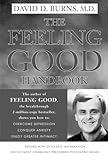This is the book my therapist had me read as part of my “homework” between sessions.
While this is completely anecdotal, it’s helped a number of people I’ve recommended it to and they have recommended it to others, who also have been helped. Learning what emotions are, what they mean, and how to recognize them is empowering.
It's also been shown in experiments to be beneficial: see e.g. http://psycnet.apa.org/journals/ccp/63/4/644/ http://psycnet.apa.org/journals/ccp/65/2/324/
I know there's also another study that compared it to a placebo book instead of just a waiting list control group, and it was better than the placebo book too.
First of all, depression is characterized by people who have distorted thinking about themselves and rationalizations for avoiding treatment. So that discussion is going to be necessary to have.
Secondly, it's reasonable to be skeptical about psychiatry and self-help books. The industry is saturated with snake oil. One has to rely on one's own judgment or one would be endlessly drowning in research. Judging books by their cover isn't just appropriate, it's mandatory.
Sometimes literally. One of the best-selling self-help books for CBT depicts a guy with a lobotomized smile floating in a dreamy cloudscape with the title "Feeling Good".[1] When it was prescribed to me I was disgusted. It looks like Stuart Smalley.[2]
But people who made the same mistake were corrected by others who had read research, or had personal knowledge. Which leads me to my last point: head-butting has its place. In the wild, animals who butt heads are doing so to determine which is the stronger, without actually engaging in wasteful combat. Similarly we are often arguing to probe which argument might be better, without fully testing it. It's enough, sometimes, to sense someone's confidence, to see a glimpse of the detail of their knowledge, even if they don't cite anything.
That heuristic is highly exploitable by people who have abnormal abilities to project confidence (aka, "confidence men"). But it's all we've got in a world that none of us have time to fully investigate.
At the very least, in that discussion, I hope people learned they couldn't just dismiss CBT out of hand; intelligent and experienced people had decent arguments for it.
[1] http://www.amazon.com/Feeling-Good-Handbook-David-Burns/dp/0... [2] http://schlegelrock.com/wp-content/uploads/2011/03/stuart-sm...
- Change: change is a sequence of stages you move through according to well-defined processes: (1) pre-contemplation (where you haven't started considering change, or are even aware it's an option), (2) contemplation (where you're considering change but haven't decided), (3) preparation (where you've decided to change and start preparing for the consequences of change), (4) action (where you actually practice change) and (5) maintenance (where you maintain change - going to gym once is change, but doesn't really count :)
That 'instant' you refer to is familiar to me and IMO it is when your brain collects enough awareness of your push/pull factors to move you from preparation (3) to action (4). Many people underestimate how critical preparation is, and for most people steps 1, 2 and 3 are not conscious at all and you will go back and forth over them for years. If you're quitting smoking but smoking gives you a break from your annoying boss, or it's how you socialise, or gives you access to the cute guy/girl you're into, and you go unprepared (unaware) into action and quit smoking you are highly likely to relapse (i.e. go back to stage 1 or 2).
I highly recommend reading Prochaska et al.'s "Changing for Good" (http://www.amazon.com/Changing-Good-Revolutionary-Overcoming...) to understand about the stages of change, how to evaluate where you are w.r.t. a certain change and if you're ready to move forward to the next stage, and the processes that help you move from one stage to the next (taster: 'commitment' is only suitable from the 3rd stage onwards, and can actually hurt your chances of successfully changing if you commit when you're in an earlier stage!).
- Changing the way you think: David Burns' books, particularly the "Feeling Good Handbook" (http://www.amazon.com/Feeling-Good-Handbook-David-Burns/dp/0...), and Helmstetter's "What to say when you talk to yourself" (http://www.amazon.com/What-Say-When-Talk-Yourself/dp/0671708...)
- Awaken the Giant is a great book, and I get the timing thing you talk about. I read it first over ten years ago and it meant nothing to me. Having gained a bit of experience since then I listened to it recently about a month ago and suddenly I could relate to 90% of what was being said, and Robbins helped solidify a bunch of ideas that had previously just been floating around in my head.


- Learning CBT from a book with the help of a therapist to guide me. https://www.amazon.com/Feeling-Good-Handbook-David-Burns/dp/... The core of it is in the first few chapters. Never read the later ones once I got the concept.
- Learning how to have realistic expectations about what I can do day after day.
- Prioritize self-care and optimize for long-term performance over short term success. This includes going to bed earlier than I want. :(
- Working with my manager to have the proper accommodations. In my case, strict 40-hour work week, no work interruptions outside of that, and time off as needed.
I’ve needed accommodations less since things have evened out, but I’ll never be able to do on-call.